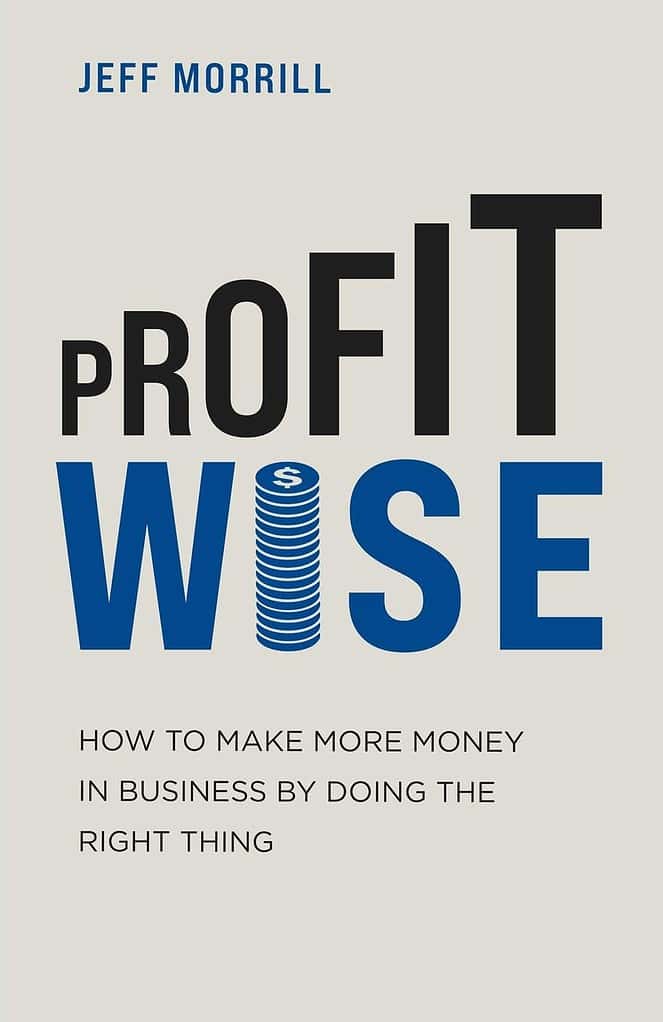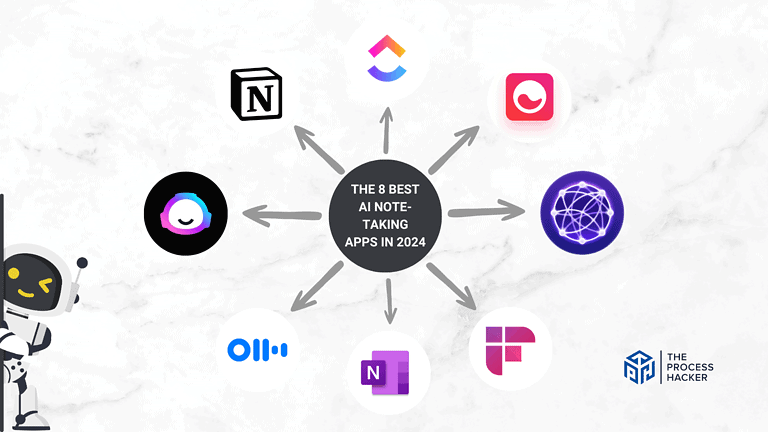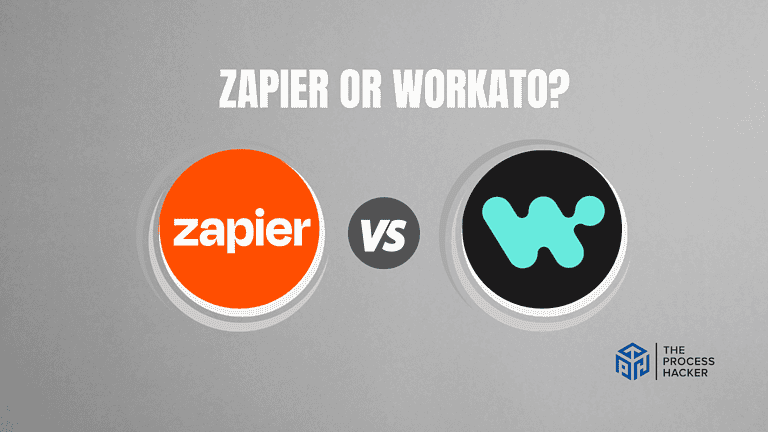Profit Wise by Jeff Morrill | Book Summary
In his book, Profit Wise: How to Make More Money in Business by Doing the Right Thing, Jeff Morrill shows you how to make more money in the long-run and enjoy the journey by doing the right thing. In turn, you will “become more profit wise, and your business becomes more profitable.”
For supplemental material, check out the online resources of bonus chapters, critical questions, worksheets, checklists, and more.
Buy Profit Wise on Amazon

Profit Wise by Jeff Morrill
How to Make More Money in Business by Doing the Right Thing
Download the PDF Book Summary for Profit Wise
Chapter 1 – Take the High Road to Raise the Bottom
It is possible to be more profit wise by focusing less on your bottom line. Instead, you prioritize what’s most important before short-term gains, resulting in more wealth both financially and spiritually.
“For most things [especially business], you just have to get started and figure it out as you go.” In 1998, Jeff and his brother started their first company, “Plante Subaru,” a car dealership. In their first month, they made a profit of $713 and, ever since, have built the business the right by:
- Seeking diverse talent that does not fit the salesperson profile of typical dealerships.
- Installing solar panels for long-term savings and reduction of their carbon footprint.
- Supporting local non-profits that are committed to doing good work locally.
As a result, “Planet Subaru” built a strong brand that shared values and maintained long-term relationships with its customers. It seems counterintuitive, but “you get more love by giving more, you get luckier by working harder, and you get happier by worrying less about your own needs.” And the best way to grow profit is to focus long-term, give value, and make a positive impact.
Profit Wise Questions
- Would you be as successful today if you were born into poverty?
- Does your business engage in tactics that make you uncomfortable? If so, can you change them for the better?
- Who are the key stakeholders in your business? Are you able to balance their needs?
- How can you better communicate the good done by your company does to improve its perception?
Chapter 2 – Defining Reality
You have to determine what makes your company unique and bring your people together around your core values. As a result, your employees will produce outstanding results. It all starts with your most important role as a leader, which is to define reality:
Reality – the values and mission of your organization that are told a coherent story of:
- Why your company exists,
- What you try to accomplish,
- How you go about doing it, and
- Who does the work.
Reality influences the strategy, decision-making, culture, and behavior in a business. Here are several questions to help you establish the reality for your company?
- What attributes make you unique and help you rise above others in the industry?
- What are your values?
- Who do you hire as employees and attract as customers?
- What activities will you not engage in?
These questions will help you capture and document your reality (vision and mission) and help you share it with your people. It will also help you hire employees and attract customers that share your values and fit your culture.
Profit Wise Questions
- What is your current reality and desired reality?
- Is there a gap between the realities? If so, how can you close the gap?
- How do your employees feel about your reality?
- How can you effectively communicate your reality both internally and externally?
Chapter 3 – Hiring
After defining your reality, the next most crucial role as a leader is hiring. You have to hire people who share your values and produce great work. You need a simple process to ask the right questions, expand your search, and choose the best individuals for specific roles.
Seek Diversity
You should hire a diverse group to build a strong team that has these benefits:
- Significantly expands your search as it is very competitive to find top talent.
- Gives underrepresented hires a chance who are grateful, motivated, and loyal.
- Distinguishes yourself with employees who look and speak like your customers.
- Improves decision-making as there are more viewpoints factored in.
Hire Well
Here are several tips to be successful at hiring:
- Choose candidates based on great character and shared values.
- Obtain excellent results from those that are ordinary and extraordinary.
- Hire the right person even if you have no openings or they lack experience.
- Place people into roles that fit their personality and skills.
- Retain the best people by keeping pay competitive and showing appreciation.
- Expand your talent pool to women using targeted advertising, allowing for related experience, and adopting progressive personnel policies.
Establish A Simple Effective Hiring Process
A flawed hiring process will result in bad hires, so create an effective hiring process as follows:
- During recruitment, ask candidates to submit a resume and cover letter.
- Provide a list of frequently asked questions (FAQs) for inquiring candidates.
- Conduct a brief, informal call to screen for their professionalism and communication.
- Conduct at least three in-person interviews using the same questions for all candidates applying for the same role:
- First: Have one manager interview to determine whether they have potential.
- Second: Have two/three others evaluate fit to the role and company.
- Third: Have the candidate shadow your business and meet front-line employees.
- Choose the applicant that possesses the skill and values over interview performance.
- Make a decision quickly and provide an offer to your candidate.
- After hiring, provide the training and tools to succeed in their new role.
Minimize Firing and Consciously Unhire
Sometimes, you have to fire people; however, you can minimize this through the following:
- Make fewer mistakes during the hiring process.
- Pay people based on performance, which can cause underperformers to quit.
- Be patient with employees who struggle developing skills.
- Set performance standards to help underperformers rise to the occasion.
If you have to fire, conduct the conversation humanely and try to maintain the relationship.
Determine Compensation and Pay Plans
You should take compensation seriously, keeping the following in mind:
- Deal with compensation issues immediately and be transparent regarding changes.
- Avoid overpaying or underpaying your people.
- Annually audit pay to ensure that employee contributions match their earnings.
You should use performance-based pay plans to motivate employees to increase output and produce better work. However, these plans can vary to fluctuations in personal output, business performance, or economic cycles. You can minimize variance in pay by doing the following:
- Determine rewards based mostly on individual performance over external factors.
- Design plans that avoid swings and steadily grow from year to year.
- Pay bonuses such that they are paid out regularly than annually.
- Align pay with the mission and goals that you want your people to execute.
Profit Wise Questions
- Do you have a documented hiring system? Is it understood by those involved in it?
- What are the ideal characteristics and values you want for your team members?
- Do you observe any hiring patterns? How can you improve your process to better reveal personal traits and skills before hiring?
- Do your recruiting ads stand out and encourage overlooked candidates to apply?
- Does your pay plan reflect contributions and reward achieving set goals?
Download the PDF Book Summary for Profit Wise
Chapter 4 – Leading the Team
This chapter shows you how to develop your leadership skills to build trust, motivate your people, and foster a healthy work culture. But first, what is leadership?
Leadership – the ability to organize others in pursuit of a common purpose
As it is not a single skill, “leadership aptitude is a cluster of talents, qualities, and experience.” Thus, when identifying people for leadership roles, you should ask the following questions:
Character:
- Do they embody your core values?
- Do they follow through on their commitments?
- Do they inspire trust in and earn respect from others?
- Do they consistently manage their emotions well?
- Do they account for the needs of others when making decisions?
- Do they do what is right even if it’s unpopular?
Skills:
- Can they identify issues and solve them?
- Can they effectively communicate the vision to others?
- Can they plan the work, delegate appropriately, and then execute on it?
- Can they make timely, critical decisions and accept feedback?
- Can they motivate others to improve instead of using fear?
- Can they settle disagreements among team members?
- Are they comfortable with the responsibility of leadership?
Build Trust
The first category of leadership skills is building trust:
- Set an example and gain respect based on how you act and react.
- Check your ego, talk less, and listen more.
- Treat everyone with respect and show them that you care.
- Assume your people are acting in good faith.
- Praise people in public and hold people accountable in private.
- Seek solutions rather than assigning blame or punishment.
- Empower your people to make decisions and solve issues to the lowest levels possible.
- Communicate consistently and clearly what needs to be done and the rationale for it.
Motivate Your Team
Motivation requires constant effort to keep people focused and excited, so you should:
- Uniquely approach each person with bonuses, praise, status, recognition, awards, etc.
- Recognize and celebrate the accomplishments.
- Avoid micromanaging, interfering, or tell them how to do things.
- Be there for your employees in their difficult moments.
- Implement incremental changes to avoid overwhelming employees.
Maintain a Healthy Culture
Culture is “what your people do when you’re not looking,” and it needs to be maintained:
- Express appreciation for new ideas and differing opinions from your employees.
- Mentor your people and encourage company-wide mentorship to maintain knowledge.
- Walk around the business weekly to observe operations and talk to your team.
- Use words intentionally as language impacts how we think.
- Promote people from within rather than hiring outside executives.
Profit Wise Questions
- What is your definition of leadership?
- Do you and your managers follow through on your commitments?
- Do your team members share your values and act accordingly?
- What are your strongest and weakest leadership qualities? What can you do to improve your weaknesses?
- Do you have any unfavorable people in leadership roles? How are you mitigating that?
- Do you and your managers mentor the individuals on your teams?
Chapter 5 – Marketing
Marketing is all about effectively communicating your message with likely buyers. You can reach new prospects by having the media and existing customers share your business story.
Start With a Good Business Name
Your name is a huge decision and provides the first impression, so consider these questions:
- Is it memorable?
- Is it web-friendly?
- Is it simple?
Create a Compelling Slogan
You can position your business by creating a slogan that expresses your unique differentiators from your competition. Then, repetition will help it become ingrained in the mind of prospects.
Marketing Methods
There are four main ways to deliver your message:
- Paid media – “advertisers who disseminate your message for a fee, such as radio stations and internet banner display companies.” You have control over your message and the details for placement. However, paid media is costly, yields a low return on investment, can show uniqueness, and attracts demanding customers.
- Owned media – your own resources, including the following:
- Website: Tells your business story, shows why you are unique, and attracts prospects using search engine optimization.
- Email List: Holds customer details to stay in touch and motivate to buy again.
- Earned media – “reporters, bloggers, and others who tell your story.” You can build credibility by soliciting people to share their favorable opinion with others. You should invite reporters when you do something newsworthy, innovative, or charitable. Also, post stories to a Media page on your website to live on.
- Social media – “internet networks of people such as Instagram, Facebook, and YouTube. This media is “a hybrid of owned media and earned media,” as you control your content but have to live by the guidelines and algorithms. You can build your brand and gain attention by posting and having your followers share your posts.
To learn more about marketing, check out The 1-Page Marketing Plan (book summary) or Building a StoryBrand (book summary).
Profit Wise Questions
- What is your overall marketing strategy, and who is responsible for it?
- Is your marketing consistent with the values of your company?
- Who are your target customers? Are you effectively reaching them with your marketing?
- What are the metrics for success and Return on Investment of your marketing methods?
- What do your team members think of your company’s marketing?
Chapter 6 – Quality Customer Service
When your people deliver excellent customer service and sales experiences, you will serve your customers well. You will earn their business today and loyalty to buy again in the future.
Develop Sales and Customer Service Skills
To win over your customers now and again, you should train your people to do the following:
- Sincerely build rapport through authenticity, friendliness, and compliments.
- Remove barriers that prevent the customer from buying.
- Stop talking and listen carefully to the customer’s wants and needs.
- Ask questions that focus the customer’s attention on the point you are trying to make.
Help Dissatisfied Customers
Here are several ways to manage customers who are dissatisfied with your business:
- Assign specific employees with the experience and authority to work with upset people.
- Listen to the customer’s concerns, show empathy, and sincerely apologize.
- Assure the customer that you will help and make a plan to find a solution.
- Solve the issue quickly. If you can’t, stay in touch and provide updates.
- Be firm as the customer is not always right, and you don’t have to accept bad behavior.
- When you solve the issue, decide whether you will do something extra for the customer.
- Finally, meet with your team to figure out how to prevent a reoccurrence of the issue.
Sales and Customer Service Strategy
Finally, here are some strategies to deliver an excellent sales and customer service experience:
- Deliver quality service and create a comfortable environment to gain a competitive edge.
- Monitor and learn from the mistakes from others in your industry at their expense.
- Tailor your experience to appeal to most of the customers you want and forget the rest.
Profit Wise Questions
- When an upset customer calls or emails your business: (1) What happens? (2) Who responds? (3) How quickly? (4) Will they be able to solve their issue?
- Are you hiring, training, and retaining people who are authentic, friendly, motivated, and conscientious? Can they ask good questions, listen, remove barriers, and solve issues?
- Are your sales and customer service processes easy for your team and customers?
- How does your team identify issues, discover root causes, and solve the problems?
- Are your customer experiences memorable and enjoyable enough that they will want to return and recommend your business to family and friends?
Download the PDF Book Summary for Profit Wise
Chapter 7 – Negotiating
This chapter helps you improve your negotiation abilities to get enough of what you want and feel satisfied by the deal. The first important concept in negotiation is leverage:
Leverage (Power) – “the ability to confer benefits or impose costs on the other party”
In the book, Getting to Yes, Roger Fisher and William Ury discuss their concept of BATNA:
Best Alternative to a Negotiated Agreement (BATNA) – the course of action that a party engaged in negotiations will take if talks fail and no agreement can be reached
Before the negotiation, knowing your BATNA will stop you from committing to undesirable deals.
Negotiation Tips
“Just because you have leverage does not mean you should always use it,” so you should:
- Prepare by doing your due diligence before going into the negotiation.
- Ask questions to learn about the needs and objectives of the other party.
- Practice empathy as many want to be in control, liked, respected, and treated fairly.
- Be flexible in your thoughts as you will stay opened mined and identify unique solutions.
- Fight for the most significant issues, and let the inconsequential concerns go.
- Avoid being desperate, hold firm, and be willing to walk away from a deal.
- Act professionally and in good faith and don’t take things personally.
- Preserve your reputation and focus on creating long-term relationships when possible.
- Read contracts before signing as your leverage goes away after you sign.
Negotiating the Price of an Item
Here are specific tips for negotiations for the price of something:
- Avoid giving something away for nothing, so make sure to receive something in return.
- Never Split the Difference as you are making concessions without getting commitment.
- Make multiple smaller concessions instead of a big one to provide a few wins.
- Show the other party that they won and avoid creating remorse in them.
Profit Wise Questions
- Are you a confident, effective negotiator? What are your strengths and weaknesses?
- Do you negotiate too little, getting less favorable terms than you deserve?
- Do you negotiate too much, taking advantage of others, or hurting your reputation?
- How comfortable are you in conflict? Do you stay logical or get emotional?
- How do you prepare for a major negotiation? Do you role-play the scenario?
- How do you define a successful negotiation? Are you able to achieve that outcome?
Chapter 8 – Making Decisions and Solving Problems
This chapter shows you how to make good decisions and solve issues to prevent reoccurrence:
Decide Relentlessly
When making decisions, examine the facts and data, and determine the type of decision to figure out how to make it:
- Type 1 Decision – “consequential and irreversible … decisions that must be made methodically, carefully, slowly, with great deliberation and consultation”.
- Type 2 Decision – changeable, reversible ones that don’t have many negative consequences effects that can be made quickly from the appropriate individual or team
Getting Good Advice
- Establish and maintain your own “personal board of directors” to guide you, give advice, help you make decisions, and hold you accountable.
- Select people from your mentors, fellow business owners, friends, and family.
Working with Attorneys
- Understand that lawyers present as your advocate, but their interests are tied to profit.
- Keep attorneys around for legal issues, but you should only sue as a last resort.
Knowing Thyself
- Avoid making important decisions under intense emotion or stress.
- People make the best decisions when the analytical parts of the brain work are working well with the emotional parts.
Evaluating Mistakes
- Understand that not all mistakes are created equal.
- Focus on the information available or obtainable when the decision was made.
- Distinguish between lack of experience and a lack of execution.
- Avoid overreacting to the negative consequences of a mistake.
- Look for the silver lining when you or another employee has made a mistake.
Profit Wise Questions
- Do you have a quick, practical way to make decisions with key employees?
- What were your last three bad decisions? Why did each go badly?
- What is the mindset and environment in which you make your best and worst decisions?
- How fast do you make decisions? Is it too slow, quick, or just right?
- Who is on your personal board of directors? Do they provide advice and accountability?
Chapter 9 – Making the Most of Your Time
You need to use your personal resources wisely on the things that matter the most. Here are tips to allocate your time and energy to achieve your professional and personal goals:
- Eat That Frog (book summary) early in the day to feel accomplished and prevent problems from growing.
- Understand the flawed relationship between perfectionism and procrastination.
- Perform your Deep Work (book summary) during your peak energy and focus state during the day.
- Quit for the day when you are losing focus and are getting little work done.
- Leave room in your daily schedule to provide buffers and deal with emerging issues.
- Protect your flow state as interruptions can significantly diminish your productivity.
- Be selective when responding to email, as a phone call or team meeting may be better.
- Understand that life is about solving problems, so show up with the right attitude.
Bandwidth
The Eisenhower Matrix helps you categorize tasks in terms of importance and urgency:
- Important/Urgent (Do): These essential pressing tasks usually become the top priority.
- Important/Not Urgent (Decide): This important work should be planned and organized.
- Not Important/Urgent (Delegate): This work is not pressing and can be delegated.
- Not Important/Not Urgent (Delete): This work is unnecessary and is distracting.
The Life Cycle of a Career
There are three primary stages for the lives of business owners:
- Growing Years: You are acquiring skills, making connections, and learn from mistakes.
- Power Years: You combine youthful energy with the experience to do complex projects.
- Wisdom Years: You work smarter, not harder, to use your time and energy wisely.
Profit Wise Questions
- Which tasks could you delegate? What changes can you make to delegate them?
- Which life cycle of your career are you in? How can you adapt your business role to meet the demands of your current stage?
- Do you spend the majority of your time in the urgent/important quadrant? If not, can you change your work environment to increase focus and reduce distractions?
- Are your life inputs (emails, texts, memos, or meetings) a burden to getting work done? What changes can you implement to manage inputs in a better way?
Chapter 10 – Success for the Long Term
This chapter shows you how to avoid burnout and set intentions for pursuing the life you want.
Avoid Burnout
Burnout is “the chronic condition that occurs when your challenges take more energy from you than they return.” So here are ways to avoid or delay burnout:
- Take care of yourself first before helping others by maintaining good health and habits.
- Set boundaries with your time and energy by delegating more and working less.
- Focus and stress about the more difficult situations, and don’t worry about the rest.
- Understand your weaknesses as you may need a break or have to be content.
- Try to find joy in everything you do or at least something as life is short.
- Make time for your friends and family as they are a vital part of your life.
- Mentor your own successor to take over when you temporarily or permanently move on.
Set Your Intentions
You get to choose how to spend your life, whether making excuses or living out your dreams. You have to take responsibility for your own life and take 10X action on your intentions (goals). Thus, you should establish and commit to your intentions using this process:
- Determine the gap between your current state and desired circumstances.
- Commit your intentions to paper to instill accountability.
- Decide on a limited number of intentions to better focus your time and energy.
- For task-oriented intentions, identify specific smaller SMART goals and deadlines.
- Share your intentions and progress with your personal board of directions.
- Review your intentions regularly to keep you focused on them.
Profit Wise Questions
- Does your work fuel or drain you? Have you gained or lost excitement for your work?
- Do you have healthy boundaries between your professional and personal life?
- How many friends could you call immediately for help? Have you been a good friend?
- Are you grooming a successor? If not, do you plan to have your business live on if you are temporarily or permanently gone?
- Do you have a process to set your intentions? If not, why not?
Download the PDF Book Summary for Profit Wise
Conclusion and Next Steps
“While you earn a living, remember that financial achievements constitute only a small part of a worthwhile life. Honorable businesses consider the needs of everyone who depends upon them, and they serve causes nobler than just the bottom line.”
In his book, Profit Wise, Jeff Morrill shows you how to build your business using systems and processes while doing the right thing. For more, get your own copy of the book here or check out the online resources of bonus chapters, critical questions, worksheets, checklists, and more. Also, here is the publisher’s website. For additional help on systematizing a business, check out Traction (book summary) by Gino Wichman.







